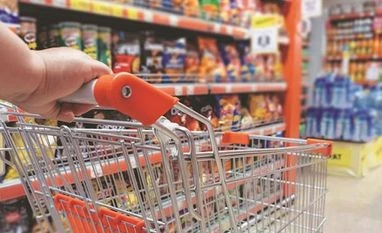With Covid cases on the rise in India once again, consumer goods companies are gearing up for a third wave of the pandemic. They are stocking up on their products, and optimising pack sizes, expecting a surge in at-home consumption in the event of tighter restrictions or a possible lockdown.
Most companies were caught off-guard when the first wave of the pandemic struck in March 2020 and a nationwide lockdown was imposed. While demand for food products and essentials surged during the period, companies were unable to supply them because production was hit by factory closures. Moreover, logistics, too, suffered due to curbs on movement.
This time around, companies are prepared. They are strengthening their supply chains to ensure there is no disruption in the event of restrictions.
If the first wave saw consumers pantry-stocking on bulk packs of edible oils, with households even overstocking on groceries, this time there's a growing appetite for smaller pack sizes, signalling a possible squeeze on monthly household budgets.
Also called low-unit packs, these are value-for-money propositions in pandemic times and are hence, found attractive.
Typically, consumers buy more pouches of 1 litre edible oils, but biscuits and snacks get sold in bigger packs.
Nielsen India (now known as Nielsen IQ) said in its report released in March 2020 that consumers resorted to heavy buying of staple food categories like packaged wheat flour and pulses. The market research firm witnessed significant growth in indulgent food categories as well.
“In the first wave, people resorted to stocking up, largely absent in the second wave. Consumers buy smaller packs or pouches and stock these at home,” said Angshu Mallick, chief executive officer (CEO), Adani Wilmar. He added that there could be an increase of 5-8 per cent of small-pack production.
Mallick said that the company is prepared to ramp-up production of smaller packs if demand arises.
The company has already stocked up on raw/packaging material should supply be interrupted, added Mallick.
Amul also expects to see an increase in smaller packs priced between Rs 5 and Rs 50 as people stay indoors and there's greater consumption of dairy products like cheese and butter. “It is too early, but there could be an increase in smaller pack consumption,” said R S Sodhi, managing director, Amul.
The situation is different, however, for biscuits and snacks.
Parle Products typically sees an increase in preference for larger packs when there's lockdown-like restrictions. “During a wave, the traction in larger packs increases. We see demand jump 15-20 per cent,” said Mayank Shah, category head, Parle Products.
However, demand for its lower priced packs - typically consumed out-of-home - may see a slight dip, observed Shah.
"We have already stocked up across depots and retailers," said Shah.
CavinKare has seen demand for its larger packs pick up since the beginning of the pandemic. It has seen overall demand increase 25-30 per cent since the start of the pandemic.
However, there has been no change in demand for sachet packs for CavinKare.
“Since the Covid break-out, we have seen larger packs being picked up. Demand rose substantially in the first wave and stabilised as in-home consumption picked up,” said C K Ranganathan, CEO, CavinKare.
Bikanervala Foods, which sells Indian snacks under the brand name Bikano, has seen demand for snacks grow over the past two years as the pandemic prompted consumers to create at-home eating occasions.
“We have seen a surge of 20 per cent on packed snacks priced Rs 5 and Rs 10 in the second and third quarters of 2021-22. We are also expecting a 15 per cent surge in the months to come,” said Manish Aggarwal, director, Bikano, Bikanervala Foods.
He said the company is gauging the present situation and taking precautions to fight any major issues with supply chain and logistics.
“We have coped well through digitisation and e-commerce sales during the past two years,” said Aggarwal.
Unlock 30+ premium stories daily hand-picked by our editors, across devices on browser and app.
Pick your 5 favourite companies, get a daily email with all news updates on them.
Full access to our intuitive epaper - clip, save, share articles from any device; newspaper archives from 2006.
Preferential invites to Business Standard events.
Curated newsletters on markets, personal finance, policy & politics, start-ups, technology, and more.
)